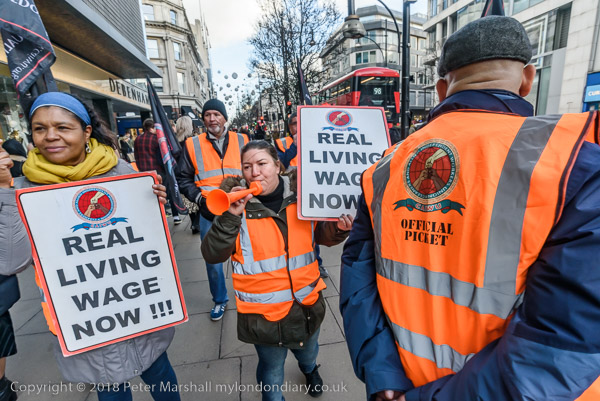
It was rapidly approaching the time of year when most sentient activities close down for the holidays. For what used to be Christmas but has now developed into a rahter longer holiday apparently stretching for most until some time in the New Year. Except of course for people who work in shops, who endure the last minute rush to get provisions and presents and then return for the frenzy of the Boxing Day and New Year sales.
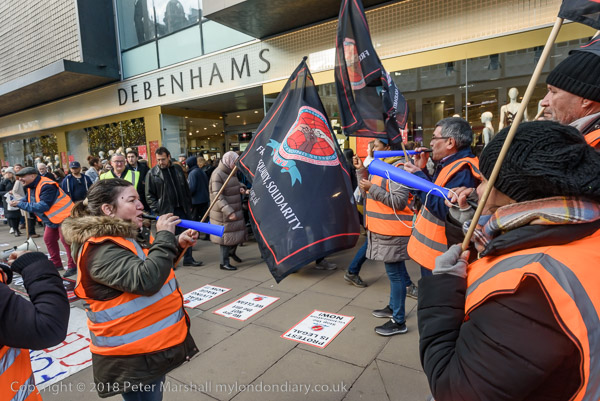
Unsung and under-appreciated among these workers are the cleaners, who keep the shops fit to shop in. Most of them come from London’s migrant communities, and many work for wages that keep them in poverty and working conditions that are shameful. Some employers event try to withold or evade the statutory minimums, and arbitrary and repressive management with disregard for worker’s health and safety seems to be more or less routine.
With a few honorable exceptions, mainly down to union activists in particular branches, the problems of these low paid migrant workers have tended to be ignored by the larger established trade unions. Low paid workers who joined them too often found the people who were meant to represent them had little interest in those at the bottom in organisations and were more concerned with keeping differentials and promoting the cause of the better paid – and left to set up their own grass roots unions.
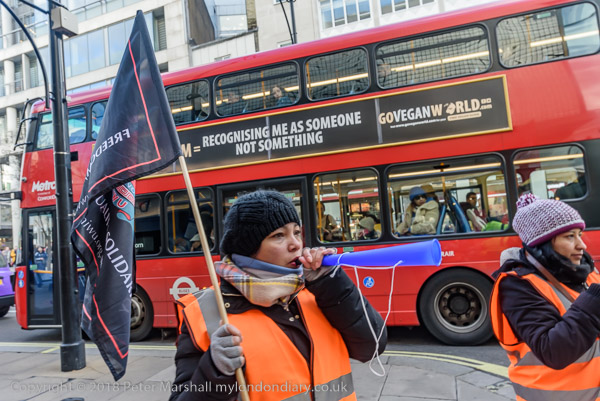
A passing bus has a suitable message; cleaners want to be recognised and treated with dignity and respect
I’ve photographed a number of actions by these unions over the years and almost all have ended with significant gains for the workers, both in terms of pay and conditions. The difference between the current minimum wage (the Government misleadingly call the minimum rate for over 25s the ‘National Living Wage’, though it is well under the UK Living Wage) of £7.83 and the London Living Wage, currently £10.55 per hour is a huge one for low paid workers, perhaps best appreciated by the calculation that to earn the minimum the Living Wage Foundation calculates is needed to live in London at the lower rate would mean a worker doing an extra 14 hours on top of their 40 hour working week.
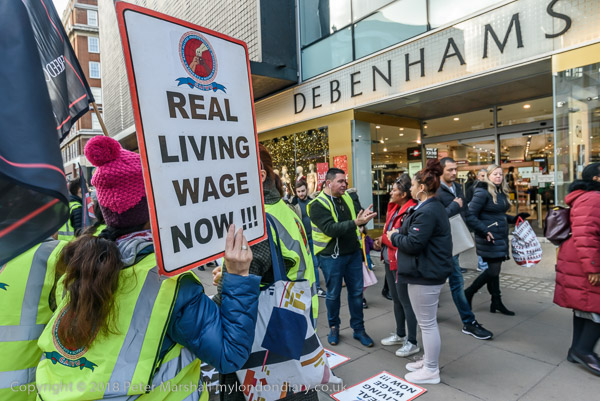
For some, getting the higher rate means they can afford to travel to work by tube instead of by bus, and for those who can only afford rents in the outer areas but work in the city centre this may cut travel times to and from work by a couple of hours each day. Buses are cheap but longer journeys can take an age.
Like many companies, Debenhams does not directly employ the workers who clean its shops. It saves money by paying another company, Interserve, to employ them. Interserve cuts costs by paying low wages, giving them the minimum conditions of service, and increasing workloads to an intolerable extent, employing them under conditions that a more responsible company like Debenhams would be ashamed to offer.
Back in May 2018, the workers asked Interserve to pay them the London Living Wage, but the company have refused to discuss the situation, saying that it will not recognise the trade union, CAIWU, the Cleaners and Allied Independent Workers Union that the cleaners belong to. So today the workers were on strike, protesting on the pavement outside the Oxford Street store along with other CAIWU members and trade unionists, making a great deal of noise, dancing to Latin-American music, making short speeches about why they were on strike and handing out leaflets to the passing shoppers. Those who stopped to find out what the dispute was about almost all expressed their support, and some stopped for a few minutes to join in the dancing.
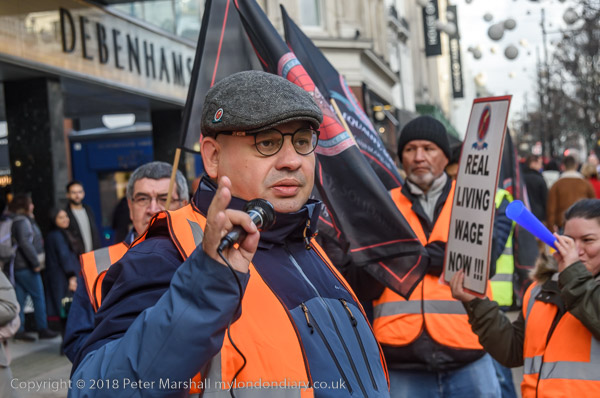
Debenhams so far have I think said the cleaners pay and conditions are nothing to do with them. They claim to have no responsiblity for this people who work in their store. But usually in disputes like these once the shop’s operations are disrupted they start to take an interest and put pressure on the outsourcing company, even if only behind the scenes, and a succesful conclusion is reached.
Unfortunately with some workplaces, the gains made are only temporary. Outsourcing contracts come to an end and a new round of bidding leads to a new employer whose low bid (and shareholder profits) again depends on screwing the workers, either by reneging on the earlier settlements or by cutting the number of workers, increasing their workloads. The only real solution is to end out-sourcing, something which various Labour shadow ministers have promised they will do when they get into office.
More pictures at Debenhams Pay Your Cleaners
______________________________________________________
There are no adverts on this site and it receives no sponsorship, and I like to keep it that way. But it does take a considerable amount of my time and thought, and if you enjoy reading it, a small donation – perhaps the cost of a beer – would be appreciated.
My London Diary : London Photos : Hull : River Lea/Lee Valley : London’s Industrial Heritage
All photographs on this and my other sites, unless otherwise stated, are taken by and copyright of Peter Marshall, and are available for reproduction or can be bought as prints.
To order prints or reproduce images
________________________________________________________